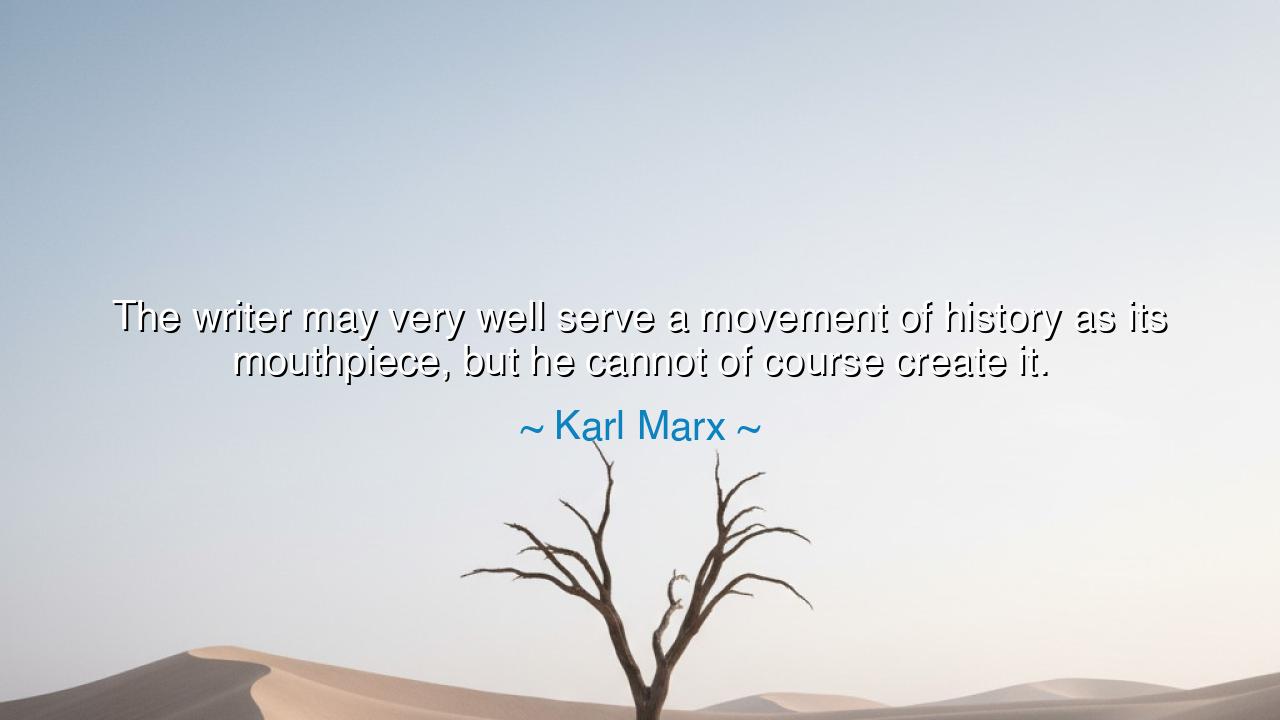
The writer may very well serve a movement of history as its
The writer may very well serve a movement of history as its mouthpiece, but he cannot of course create it.






“The writer may very well serve a movement of history as its mouthpiece, but he cannot of course create it.” — Karl Marx
Hear, O seeker of wisdom, and bend your heart to understanding. In these words, Karl Marx, the seer of social transformation, speaks of the mysterious bond between the writer and the forces of history. He reminds us that the pen, though mighty, is not the origin of the storm—it is the lightning that reveals its path. The writer is a mouthpiece, a vessel through which the tides of an age find speech. The ideas that change nations are not born in solitude alone; they rise from the toil, hunger, and hope of the people. History moves first in the hearts of the multitude—only then does the writer give it voice.
This saying was forged in an age of upheaval. Marx, who beheld the fires of the Industrial Revolution, saw cities blackened by smoke and men chained to machines. In that chaos, a thousand writers raised their voices—poets, philosophers, reformers—yet Marx perceived a deeper truth: none of them created the movement they served. They were born from it. The cries of the workers, the sorrow of the oppressed, the pulse of revolution—these were the real authors of change. The writer, no matter how brilliant, is but an interpreter of the age’s agony and aspiration.
Look to history, and you will see the truth unfold. When Victor Hugo wrote Les Misérables, he did not invent the suffering of France’s poor—he reflected it, gave it form, and carried their pain into the hearts of kings. When Thomas Paine wrote Common Sense, he did not summon liberty from the void; he merely ignited the flame that already smoldered in the souls of the colonists. These men did not create movements—they served them, and in serving, they became immortal. The river of history flowed through them, and their words became its song.
The writer, then, is both prophet and servant. He listens to the whispers of his age and translates them into thunder. Yet he must never believe himself a god who commands the storm. For when pride overtakes the scribe, his ink dries and his truth fades. The forces of history—economic, social, spiritual—move according to deeper laws than any mortal’s will. The wise writer bows before them, learning their rhythm, their sorrow, their direction. The foolish one tries to lead them, and is crushed beneath their weight.
There is humility, but also power, in this understanding. The writer’s greatness lies not in invention, but in attunement. Like the shepherd who follows the wind to find his flock, the true writer follows the breath of his time. He senses its needs, its fears, its destiny—and gives them speech. This is the sacred duty of the artist, the thinker, the historian: to let the age speak through him, not for him to shout above it. For only through such surrender does his voice gain the resonance of eternity.
Yet this truth does not belong to writers alone. Each of us, in our small ways, is a mouthpiece of the age we live in. We carry its contradictions, its struggles, its light and shadow. To deny that is to deny the soil from which we grow. Therefore, the lesson of Marx’s words is this: know the forces that shape you, and use your gifts to serve them wisely. Do not imagine yourself the creator of destiny; rather, become its conscious ally. When you understand your place within the movement of history, your actions—however humble—gain purpose and strength.
In the end, the writer is not the source of history’s fire, but the torchbearer who carries it forward. The movement belongs to the people; the flame belongs to time. But the writer—ah, the writer ensures it is never forgotten. So let all who create remember this balance: serve truth, not vanity; echo the age, but with conscience and compassion. For though you may not create history, you can give it voice—and through that voice, awaken the sleeping hearts of a generation.






AAdministratorAdministrator
Welcome, honored guests. Please leave a comment, we will respond soon